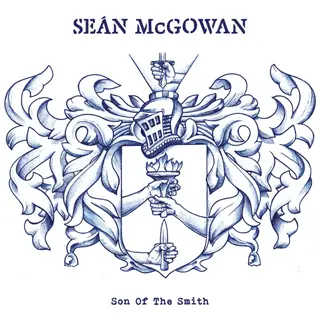Son of the Smith by Sean McGowan – Album Review

By David Schuster
I’d previously listened to Son Of The Smith by Sean McGowan a few times, but always in parts. It was only when I put it on in the car and listened to it from end to end that I realised its intent and ambition: It’s a concept album for our times! The songs are loosely linked into an imaginary tube train journey across London, exploring and commenting on current social issues. The Southampton singer-songwriter’s decision to present his first full length record in this way is a brave one. The question is: Is this still a viable format for today’s music consumers?
‘Mind The Doors’ sets the scene nicely. The singer gets on the underground, but the people and surroundings are so depressing he can’t wait to put in his headphones and escape. Socially observant lyrics cleverly nail the failings of modern day life. At one minute and ten seconds it’s short and sharp, a technique employed to good effect by The Smiths; get in, make your point, get out, and there’s nothing wrong with that.
The second track, ‘Cuppa Tea’ is one of the best on the CD. This features the whole band, electric guitar, drums and bass. Consequently it has a much fuller sound, and a great bass line. Its bouncy, catchy feel starkly contrasts to words which highlight the media quoted fiction that wealth ‘trickles down’ from rich to poor. There’s a Del Boy geezer appeal to this which obviously draws on McGowan’s personal experiences, reminiscent of Jamie T.
“Funny, acerbic vocals”
‘Romance Ain’t Dead’, ‘Skin & Bone (& Blood & Moaning)’ and ‘Porky Pies’ are all cut from the same cloth. Funny, acerbic vocals with lots of current cultural references, words and phrases: “Lifetime of monotony, banished to poverty. Worship celebrity? I don’t think so” and “I’m sick and tired of spending my whole life on my knees. Can I have some more sir please?”. At times the lyrical black humour matches Carter the Unstoppable Sex Machine from the dark times of the late eighties.
It’s at this point that things become a lot more darker and downbeat. The next six numbers, including ‘Oh My Days’, ‘Springhill’ and ‘Autopilot’ are all sombre, pared down to acoustic guitar and vocals. I’d already mentally compared this style to Billy Bragg, before finding out that McGowan is good friends with Bragg and has supported him on tour. That’s not to say these aren’t good songs, the poignancy of ‘Springhill’ in particular brought a lump to my throat. Don’t get me wrong. I’m a long-term fan of Billy Bragg, but he has always deliberately eschewed commercial success.
The last two tracks redeem the album once again. ‘Off The Rails’ is fast and aggressive to a punk beat, like The Jam in their early days. ‘Mind The Gap’ takes us back to that hellish tube: “There must be 300 people here with room for 33”. A young mum struggles to get off with a baby and a buggy laden with shopping bags, everyone looks away because “There ain’t no love on the Northern Line”. Then, out of nowhere a school boy appears in the crowd and helps her carry the buggy off the train.
 “Powerful concept”
“Powerful concept”
Eventually I got it: The journey takes us from life on the edge through the darkness of life below the poverty line. Finally, it leaves us with the glimmer of hope that the world isn’t always as bad as we might think and finishes with the words “You can still make a difference. It’s in your hands”, repeated. So, yes, it does work as a powerful concept.
When all is said and done though, music is mass entertainment, and you have to make people want to listen to it in order to get your point across. How many people are going to invest the time to listen to the whole album, and how many are going to download their favourite couple of tunes?
It’s no coincidence that Kirsty MacColl’s cover version of ‘New England’ gets a lot more airplay than Billy Bragg’s original. The meaning of the lyrics remains the same, the message is just presented in a more engaging way. Half the tracks on Son Of the Smith fit that bill. Can I have some more sir, please?
6/10









